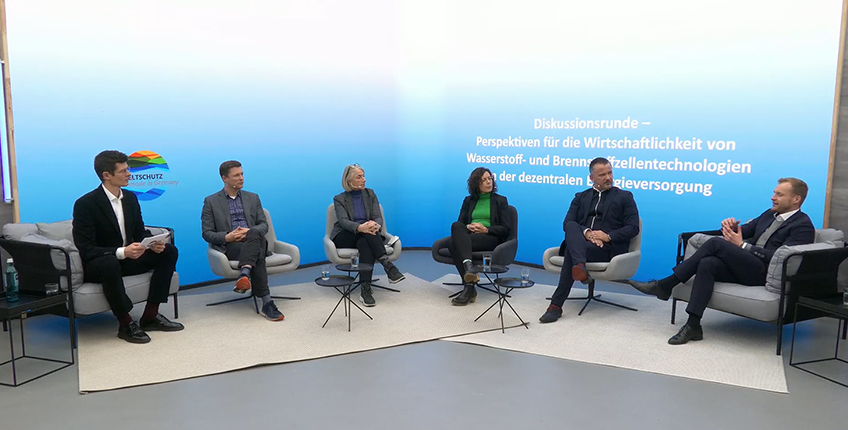As part of the Export Initiative for Environmental Protection (EXI – Exportinitiative Umweltschutz), the “Prospects for the economic viability of hydrogen and fuel cell technologies in decentralised energy supply” online event took place on 7 December 2022.
An online event organised by the Export Initiative for Environmental Protection (EXI) of the Federal Ministry for the Environment, Nature Conservation, Nuclear Safety and Consumer Protection (BMUV – Bundesministerium für Umwelt, Naturschutz, nukleare Sicherheit und Verbraucherschutz) and NOW GmbH highlighted the prospects for the economic viability of hydrogen and fuel cell technologies in decentralised energy supply and presented them in an international context. NOW GmbH oversees the “green hydrogen and fuel cell technologies for decentralised energy supply” area within EXI.
Nilgün Parker, Head of the Sustainable Financial Policy, Environment and Foreign Trade Promotion Division at the BMUV: “With the Export Initiative Environmental Protection, the Ministry of the Environment has been supporting projects that promote the transfer of know-how and the application of German environmental protection and resource efficiency technologies since 2016, with a focus on emerging and developing countries. Global environmental and climate protection can only succeed if the necessary infrastructure, legal, political and administrative frameworks are in place. This is also an important prerequisite for the application and use of green hydrogen and fuel cell technologies. In many countries, decentralised energy supply with sustainable hydrogen and fuel cell systems can offer economically viable perspectives and create local added value for environmental protection and the provision of public services.”
The welcoming address by the Ministry and a keynote speech by Dr Kathrin Goldammer, Managing Director of the Reiner Lemoine Institute, were followed by numerous presentations as well as the showcasing of results from EXI with international perspectives in Nigeria, Chile and the Philippines.
A panel discussion in which the prospects for the economic viability of hydrogen and fuel cell technologies in various applications in decentralised energy supply were intensively discussed, capped off the conference. One of the central discussion topics was the extent to which own demand abroad can be linked with a growing demand from Germany.
Prof. Dr. Ing. Carsten Bücker, Managing Director of CBC GmbH & Co. KG, EXI project participant with the ECO-FCGen project and panelist: “The development of clever and case-specific business models is crucial in order to leverage the economic efficiency and environmental potentials of the use of hydrogen-based technologies in comparison to fossil-based solutions.”
For more information on the speakers and the panel, please consult the agenda.
Prospects for green hydrogen and fuel technologies abroad
The use of green hydrogen and fuel cell technologies in applications for decentralised energy supply can make a positive contribution towards gaining access to green environmental technologies, improving security of supply and local services of general interest, especially in many locations abroad with a high potential for renewable energies. Decentralised and off-grid fuel cell systems used in stationary or semi-stationary energy supply not only ensure a reduction in greenhouse gas emissions or increased protection of the environment and health. Using renewable energies in combination with hydrogen and fuel cell technologies can also ensure an independent and reliable energy supply, which is of great importance and at the same time offers significant potential for social and economic development in EXI’s partner countries.
The funding programme is working to identify prospects for the economically successful and sustainable use of hydrogen and fuel cell technologies in the decentralised supply of energy in demonstration projects abroad and international market potential analyses. To this end, the results of various studies on the topic were compiled in the online event.
Modelling of use cases shows significant potential
In the context of the modelling of various use cases of hydrogen and fuel cell technology in semi-stationary and stationary primary energy and emergency power supply presented by Moritz Ullrich on behalf of E4tech, a significant level of potential and advantage compared to the diesel generator has already been demonstrated under specific framework conditions. The studies and investigations presented from Chile, Nigeria and the Philippines have shown that there are also prospects for the competitive use of green hydrogen and fuel cell technology for the decentralised supply of energy in these countries, and at the same time that there is great market potential.
About the Export Initiative Environmental Protection (EXI)
The focus of the support provided by the “Export Initiative Environmental Protection” (EXI – Exportinitiative Umweltschutz) is on the benefits for the environment and people. The programme’s name is now intended to convey this focus even more clearly. German green tech know-how is exported for greater environmental protection, higher environmental standards and better living conditions.
The supported projects are to contribute to the development, harmonisation, communication and application of uniform – and, if available, global – environmental standards and the creation of suitable framework conditions to facilitate their implementation. The concrete need for support in the target country is an important aspect of the funding objective, as is the expected environmental benefit. Activities for the dissemination of environmental knowledge, environmental awareness and for building capacities are to be supported in a targeted manner in order to contribute to sustainable development and thus to the achievement of the Sustainable Development Goals of Agenda 2030 (with a special focus on the Sustainable Development Goals (SDGs))..
www.exportinitiative-umweltschutz.de
Further information:
Visit the partner page of NOW GmbH
Image: f.l.t.r. Tobias König (Moderation, NOW GmbH), Bert Wibel (DIHK Service GmbH), Nilgün Parker (BMUV), Dr. Ulrike Beyer (Fraunhofer IWU und EXI-Projekt HyTrA), Prof. Dr. Ing. Carsten Bücker (CBC GmbH & Co. KG und EXI-Projekt ECO-FCGen), Moritz Ullrich (i.A.v. E4tech). Image rights: NOW


